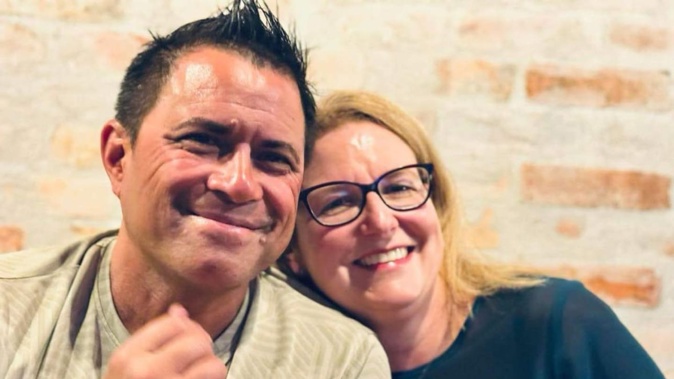
Warning: Graphic content
A small cut to the back of the head from a barber’s clippers developed into a dangerous sepsis infection and a near-leg amputation for a Rotorua man.
Since the slip of the clippers in June 2021 Lee Runga has had seven operations and spent more than two years in and out of hospital.
At the time of the injury, both Runga and the barber acknowledged the small cut but neither thought it too serious and no action was taken.
Two weeks later Runga noticed the cut was swollen and sore - then he fainted at work.
“I sent him off to the doctor and he was given a topical and oral antibiotic,” Runga’s wife Debbie Holmes told the Herald.
“Then later in the week his knee blew up like a balloon and the cut on his head still hadn’t healed and was looking even more disgusting.”
Runga returned to the doctor to have his knee examined and the wound on his head swabbed for infection.
Over the weekend the normally fit and healthy man’s health declined and on Monday morning he collapsed in the shower.
“I heard this almighty crash and went in to see him sliding down the shower door,” Holmes said.
“He was rushed to the hospital by ambulance and when we were there the results came back from the cut to his head and it was a staphylococcus infection.”
 The tiny cut from the barber's clippers was infected and grew into a significant boil on the back of Lee Runga's head.
The tiny cut from the barber's clippers was infected and grew into a significant boil on the back of Lee Runga's head.
Doctors found the bacterial infection had already developed into sepsis - a life-threatening condition where the body responds incorrectly to an infection and damages its own tissues and organs.
The sepsis infection had travelled through Runga’s body and attacked his left knee - the site of a cartilage surgery after a rugby injury 20 years earlier.
“It attacked his knee so badly he had to have three washouts and an aspiration of his knee which was incredibly painful,” Holmes said.
“He went on to have seven operations, a bone graft, and at one stage they were talking about amputating his leg.
 Doctors considered amputating Lee Runga's knee after sepsis attacked tissue around an old rugby injury.
Doctors considered amputating Lee Runga's knee after sepsis attacked tissue around an old rugby injury.
“It was just horrific. It is crazy that it was caused by a nick on the back of his head.”
Holmes contacted the barbershop when her husband was in hospital and spoke to the manager about the importance of equipment hygiene.
“I didn’t blame anyone because it is just one of those things but we have been back and noticed it is all a lot cleaner now.
“It hasn’t stopped him from going to the barber.”
 Lee Runga and Debbie Holmes want to warn others of the importance of hygiene at the barbershop after Lee developed sepsis from a small cut from some clippers.
Lee Runga and Debbie Holmes want to warn others of the importance of hygiene at the barbershop after Lee developed sepsis from a small cut from some clippers.
Last week Accident Compensation Corporation (ACC) released figures that showed up to 30 people a year seek medical treatment after a laceration injury at the barber or hair salon.
There were 155 new claims and 141 active claims since the beginning of 2018 costing more than $28,000.
The release of figures comes weeks after a mother claimed her 2-year-old son had part of his ear cut off during a trip to the barber.
Worksafe looked into the incident but said the injury was not as serious as initial reports suggested.
Runga said he wanted to share his story to raise awareness about equipment hygiene and follow-up care if someone was accidentally nicked.
Emergency physician Gary Payinda said there should be an industry standard and level of hygiene at all hair salons and barbers.
He said equipment such as clippers and scissors could harbour bacteria which was easier transferred between customers.
Immediate action after an injury was the best form of defence.
“It is the same with any cut or graze, the most important action is to rinse the wound thoroughly with water.
Payinda said tap water was fine but the wound should be “irrigated thoroughly.”
If a cut later became red, swollen or pus formed, Payinda said medical treatment was needed.
“If it gets to that stage, or if there is fever, you need to see a general practitioner and get an oral antibiotic which is more effective than anything topical.”
Kirsty Wynn is an Auckland-based journalist with more than 20 years experience in New Zealand newsrooms. She has covered everything from crime and social issues to the property market and consumer affairs.
This article was originally published by the NZ Herald here.
Take your Radio, Podcasts and Music with you








